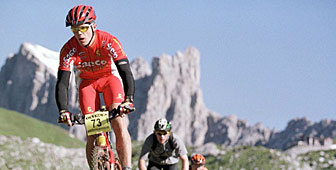
Switzerland – a biker’s paradise?

Although Switzerland is popular with cyclists, bike manufacturers have encountered bumpy roads. One after another has been forced to close.
Switzerland’s dense network of bike paths includes nine signposted national tour routes totalling 3,300 kilometres, which link the different regions of Switzerland. The network is completed by another 3,000 kilometres of regional cycle tracks.
In the year 2000 alone – more recent figures are not yet available – the network was used 3.4 million times, either for day trips or for tours lasting several days. Almost half of those discovering the country by bike were Swiss, while most of the bikers from abroad came from Germany.
On Wednesday, an international fair opens at the Messe Zurich. Called “2-Rad” (“2 wheels”), the fair features 213 exhibitors in an area of nearly 1.5 hectares over a six-day period, and spotlights innovations on the international cycle and motorcycle market.
Structural changes
The image presented by the numerous cycle tracks and the fair in Zurich is, however, misleading. The Swiss bike industry is currently going through its worst-ever crisis. “There are fewer and fewer Swiss bike manufacturers and more and more bikes are being imported – from Asia, the rest of Europe or America,” Roland Fuchs, press spokesman for “2-Rad”, told swissinfo.
One of the most prominent victims of this overall change in structure in the Swiss bike industry has been Cilo, a Swiss brand steeped in tradition, that once used to produce models for the great names of Swiss cycle-racing – Ferdi Kübler and Hugo Kobelt, to name two. Cilo was forced to cease production at the end of last year. According to its former boss, Claude Jan, “Plans are afoot to start up a new company before March that will put the name of Cilo back on the market.”
The collapse at Villiger, once the proud flagship of the Swiss bike industry, has been just as drastic: production is being transferred to the “Diamant” works in Hartmannsdorf in Germany. The Villiger works in Buttisholz in the Canton of Lucerne will become just a retail outlet.
Missing the boat
The dramatic slump in the Swiss bike industry is a result of the mountain bike craze at the end of the eighties. The Swiss were caught napping at the time and failed to see that a bike could be transformed from a simple means of transport into a piece of sports equipment. Firms such as Scott, Trek or Cannondale quickly conquered the Swiss market. The Swiss-based manufacturers had nothing to counter the new models – and they were stuck with their stocks of classic bikes.
The decline of traditional brands such as Cilo and Villiger is also a painful indication that the Swiss-based bike industry cannot escape the trend towards globalisation. Switzerland is unable to compete with Asia, where – because of the low labour costs – most bike frames are now being produced. “It’s not worth manufacturing bikes in Switzerland any more. The location costs are simply too high”, Roland Fuchs says.
Is Swiss label finished?
The decline in the Swiss bike industry has meant that the “Swiss made” label has lost a great deal of its significance within the industry. But this is not the case everywhere. Those bike manufacturers that have remained in Switzerland – such as Aarios, BMC, Cresta or Tour de Suisse – are continuing to uphold the seal of quality. These firms, which tend to be smaller, are trying to offset the cost disadvantage of using Switzerland as their production base by offering high quality.
“We see ourselves as niche specialists,” explains Arnold Ramel. Ramel is the owner of Aarios AG, based in Gretzenbach in Solothurn, and employs a workforce of 15. His recipe for success: “Our models might be more expensive than those of our big competitors, but we adapt every one of our bikes to the individual requirements of the customer and we won’t go below a certain standard of quality. We offer something that really is ‘Swiss made’. And that’s precisely why we’re still in business.”
by Felix Münger

In compliance with the JTI standards
More: SWI swissinfo.ch certified by the Journalism Trust Initiative

























You can find an overview of ongoing debates with our journalists here . Please join us!
If you want to start a conversation about a topic raised in this article or want to report factual errors, email us at english@swissinfo.ch.